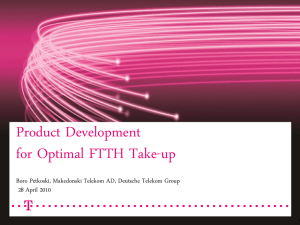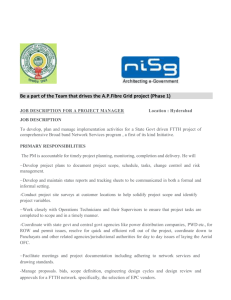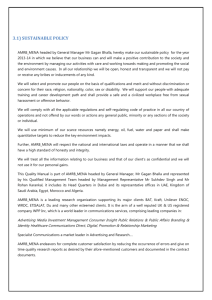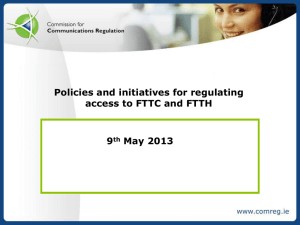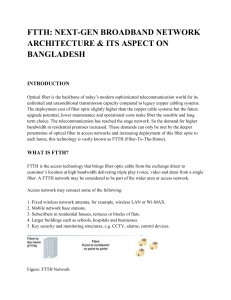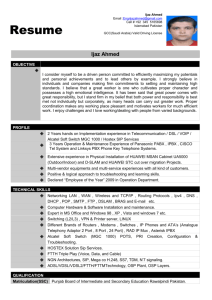information
advertisement
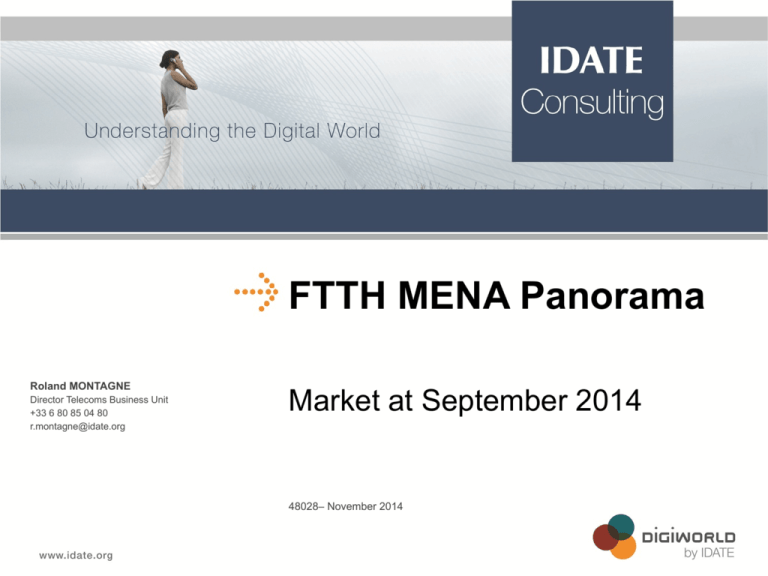
FTTH MENA Panorama Roland MONTAGNE Director Telecoms Business Unit +33 6 80 85 04 80 r.montagne@idate.org Market at September 2014 48028– November 2014 Agenda • Study Background - Objectives - Available results • FTTH/B in MENA - Overview - Overall figures - Main trends in MENA’s FTTH/B market • MENA FTTH/B main trends - - - - FTTH/B subscribers trends FTTH/B Homes Passed distribution FTTH/B technologies FTTH/B Take Rates in MENA • Main observations / drivers for FTTH/B in MENA 2 Study Background Objectives, available results Objectives • Mission on behalf of the FTTH Council MENA • Objective: to provide a complete summary of the status of FTTH/B in MENA - 11 countries analyzed (1) - Distinction between architecture: FTTH/B vs FTTN (FTTN/C+VDSL, FTTLA, FTTx+LAN) - FTTH/B Definition by FTTH Councils Worldwide(2) Characterization of each project includes: • Organization initiating the project • Key parameters & Figures • Technical parameters • Financing & Business model ► Methodology used • Desk research • Direct contacts with FTTH players (questionnaires, phone interviews) & IDATE’s partners in MENA • Information exchange with FTTH Council, MENA chapter members (1): Egypt, Iraq, Jordan, Kuwait, Morocco, Oman, Palestine, Qatar, Saudi Arabia, Tunisia, UAE (2): FTTH/B definition available at : http://www.ftthcouncil.eu/documents/Publications/FTTH_Definition_of_Terms-Revision_2011-Final.pdf 4 Available results for MENA ˃ About 41 projects listed in 11 MENA countries at September 2014 Qualitative Quantitative FTTH/B data Total FTTH/B in Morocco Maroc Telecom Meditel September 2014 Nb of Nb of Homes Subscribers passed 3 000 46 000 3 000 40 000 0 6 000 Nawras Identification Operator/Organisation Nawras, the Omani-Qatari Telecommunications Company, was created in 2004 by a consortium with Qtel (now named Ooredoo), TDC and Omani investors. Nawras should be rebranded to Ooredoo by the end of 2014. Key parameters A FTTH trial was launched by Nawras in Al Mabailah North in October 2011 covering 200 households. Initially, customers were able to take part in a free trial of high speed broadband services over the network during first 3 months. Nawras is working with Haya Water Company and the TRA to implement the fibre-optic project. The operator is using the trenches dug by Haya Water for its water reuse project to lay the FTTH cables. Following the success of its trial, Nawras said that it aims to sign up 30,000 homes to its fibre-optic infrastructure within the next five years. Its fibre network has been extended to frontier town in Al-Wusta, Tital Complex in Muscat,Bahwan Plaza Complex in Muscat, OSCC Building in Muscat. Some areas in Al Khuwair and Ras Al Hamra have been also covered. At end 2014, the operator is providing services to end users with Internet connection of up to 50 Mbps via FTTH. Figures Number of Households/Business Units passed 200 Homes passed at september 2012 400 homes passed at September 2013 (IDATE estimates) 1,000 homes passed at September 2014 (IDATE estimates) FTTx subscriber base 200 subscribers at september 2012 400 subscribers at September 2013 (IDATE estimates) 900 subscribers at September 2014 (IDATE estimates) Technical parameters Source: IDATE for FTTH Council MENA Chapter 5 FTTH FTTH/B in MENA Overview, overall results, main trends in MENA’s FTTH/B market FTTH/B in MENA – Overview ˃ More than 41 FTTH/B projects in MENA at Sept 2014 Incumbents and Alternative operators are the main actors involved in FTTH/B rollout National programs should boost FTTH/B market in MENA Total FTTH/B Homes passed in MENA at September 2014 Incumbents Municipalities / Utilities 3 138 900 150 000 1 023 500 168 700 70.0% 3.3% 22.8% 3.8% Source: IDATE for FTTH Council MENA 7 Alternative operators / ISPs Housing companies / Nat. Prog. FTTH/B in MENA – Overall Figures In September 2014 > 1,716,280 FTTH/B subscribers YoY growth (*) - Subscribers: +33.2% > 4,140,600 FTTH/B Homes Passed - Homes Passed: +355% Average Penetration Rate : 41.5% (from 41.7% at September 2013) (*) YoY growth has been calculated by comparing only the 11 countries analyzed in the 2014 panorama (vs 19 countries analyzed in the panorama at 8 September 2013) Source: IDATE for FTTH Council MENA Main trends in MENA’s FTTH/B market 4 4 significant and dynamic markets (UAE, KSA, Qatar, Oman) 1 high potential market (Iraq) 2 markets with significant announcements and progresses (Morocco, Tunisia) steady markets with few evolution nor significant announcements (Kuwait, Jordan, Egypt, Palestine) Significant changes due to the involvement of incumbents in Morocco and Tunisia Several announcements during 3rd quarter 2014 that might change the trends for 2015 9 Main trends in MENA’s FTTH/B market • UAE is the main FTTH/B market (more than 1 million FTTH/B subs) - 2 players are involved in FTTH/B market - Etisalat is dominating the FTTH/B market: o with a market share of 73% o with a national coverage UAE is leading the Global Ranking!! - Good penetration rate (subs/HP): 67%, which confirms the commercial success of FTTH • … followed by Saudi Arabia (more than 481,500 FTTH/B subs) - Market dynamism confirmed from one year to another (+71% subscribers growth between Sept 13 and Sept 14) with 2 players involved in national rollouts - This dynamism has to be confirmed on the commercial side - STC is the more important FTTH/B players: o with a market share of 70% o the largest coverage • FTTH/B market is growing in Qatar (190,500 FTTH/B subs) - Ambitious objective from incumbent Ooredoo (Qtel): o National FTTH coverage by 2014: reached ! - Competition might be enhanced for Ooredoo after Vodafone’s acquisition of QNBN => towards a duopoly? o This could have a positive impact on tariffs to end users and then on the growth of the FTTH market 10 Main trends in MENA’s FTTH/B market ˃ 2 countries with significant rollouts, more than 1 million Homes Passed Most advanced FTTH/B projects 2.000.000 1.800.000 1.600.000 Strong competition to come 1.400.000 1.200.000 Significant involvement from incumbents in 2014 1.000.000 800.000 600.000 400.000 200.000 0 Saudi Arabia UAE Source: IDATE for FTTH Council MENA Chapter 11 Qatar Oman Egypt Iraq Morocco Tunisia Kuwait Main trends in MENA’s FTTH/B market ˃ High Take Rates (1) in MENA UAE: 67.7% Qatar: 57.6% Saudi Arabia: 25.9% Average Take Rates in MENA: 41.4% ˃ In September 2014, the main architecture deployed is pure FTTH: no changes since 2010 ˃ Regarding technology, players have mainly chosen PON Main architecture deployed (subscribers segmentation) FTTH FTTB Main technology deployed (subscribers segmentation) PON Ethernet September 2014 Source: IDATE for FTTH Council MENA 12 (1) Number of subscribers in total Homes Passed 99% 1% September 2014 86% 14% Main observations / drivers for FTTH/B in MENA Main outputs No take off for the global Fixed Broadband market • The growth in FTTH/B coverage and take up rate is led by the dynamism of GCC countries, and notably UAE and KSA markets • In other countries, announcements are followed lately by concrete rollouts • The Broadband penetration is still low and current demand does not require rapid deployment of NGNs But there are some significant and ambitious FTTH/B projects • In UAE and Saudi Arabia: FTTH coverage exhaustive or near to be • In Qatar: Ooreedoo on one hand and Vodafone, willing to acquire the infrastructure deployed under the QNBN program => strong competition to come that could clearly enhanced the development of FTTH • In North Africa, Morocco and Tunisia present a strong potential due the involvement of incumbents and alternative players (respectively Meditel and Tunisiana, both willing to deploy and operate FTTH networks in dedicated neighborhoods) –incumbents have clearly accelerated their FTTH deployments in 2014 14 Main outputs FTTH/B is a priority: no noticeable FTTN projects announced to date • Most projects, operational or announced, tend to focus on FTTH rollouts • However, FTTN + VDSL is still a good solution for players in countries where the Broadband market is not mature yet and the economical context still has to get improved (Morocco, Jordan): the objective of telcos there is to be able to provide higher speed rates to end users, whatever the architecture. Incumbents are leading the markets • The involvement of alternative players is growing and could enhance rollouts (Tunisia) • As in other regions, few other players show a strong interest in FTTH/B rollouts (some ROEs in Egypt, small telcos in Jordan) Players are mainly focused on Mobile markets • Mobile Broadband subscriptions overpass fixed Broadband subscriptions in several countries (Egypt, Morocco), and this trend might not change even with the rollout of new networks • But this could be an interesting opportunity for FTTH: not only because of the need for interconnecting base station with fiber, but also because the general demand for higher bandwidth (on both wireline and wireless networks) will probably increase 15 Drivers for FTTH/B in MENA ˃ Several drivers might impulse MENA’s FTTH/B market Mobile backhaul • Fibre will be necessary to deal with the development of new mobile networks • Leapfrog from 2G to LTE is possible, such as it could happen in other regions 16 New housing programs • The growth of the Real Estate market is one of the highest, notably in GCC countries • FTTH networks are more and more often considered as a commodity National plans • MENA’s government are becoming more and more aware of the benefits of NGN • Their involvement is a way to compensate and stimulate the current lack of large scale private initiatives Low quality of existing networks • The copper networks are generally not efficient enough to support the provision of value-added services such as TV and video Cloud services • SMEs and SOHOs are heavy users of new and innovative services among which cloud storage solutions • The trust in networks is a key parameter and FTTH/B infrastructure is a good answer Higher competition • Some players are beginning to adopt a regional strategy in terms of Broadband and superfast Broadband • As an example, Zain is already present in Jordan, Iraq, Kuwait… Thank you! 17
